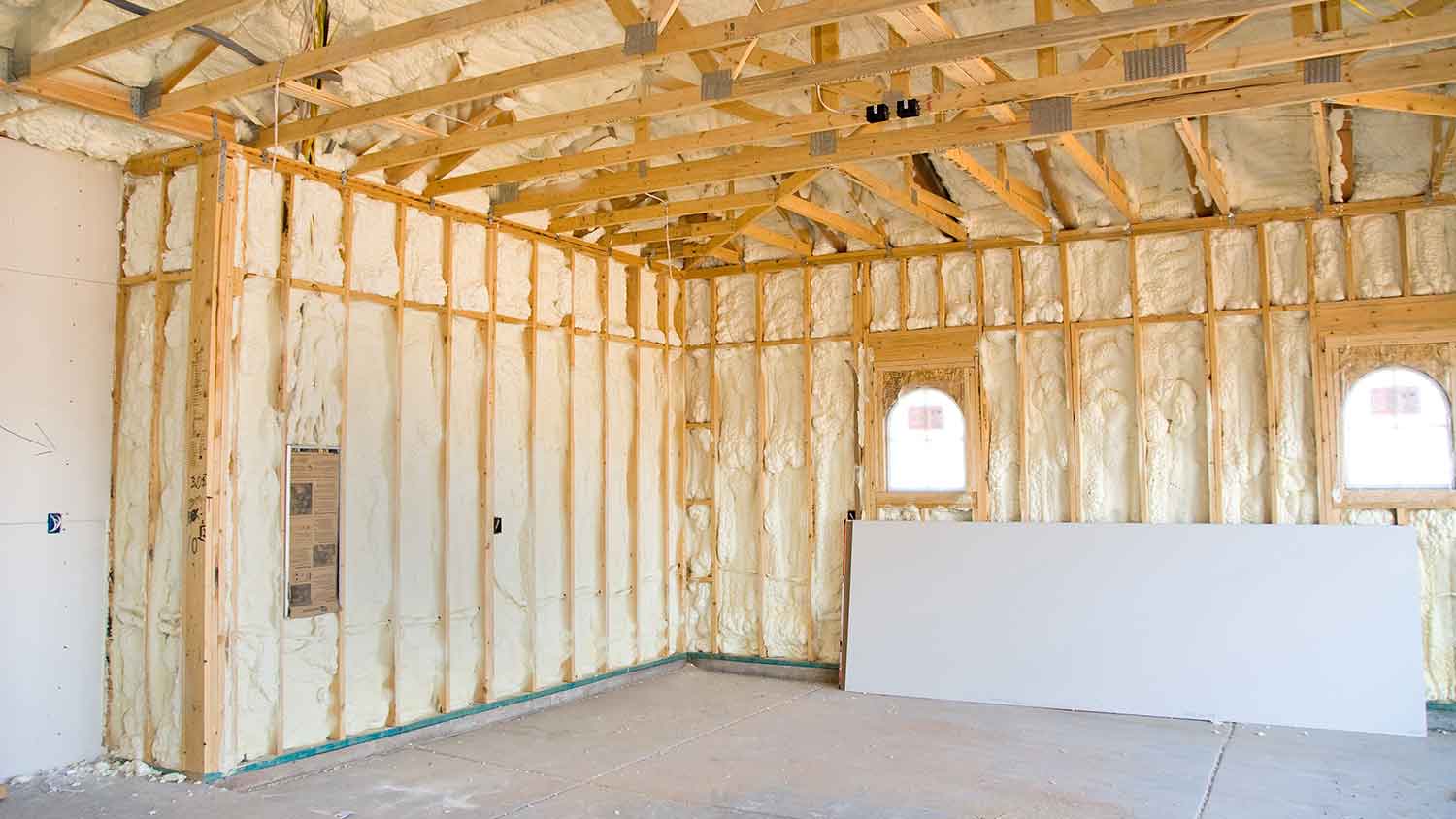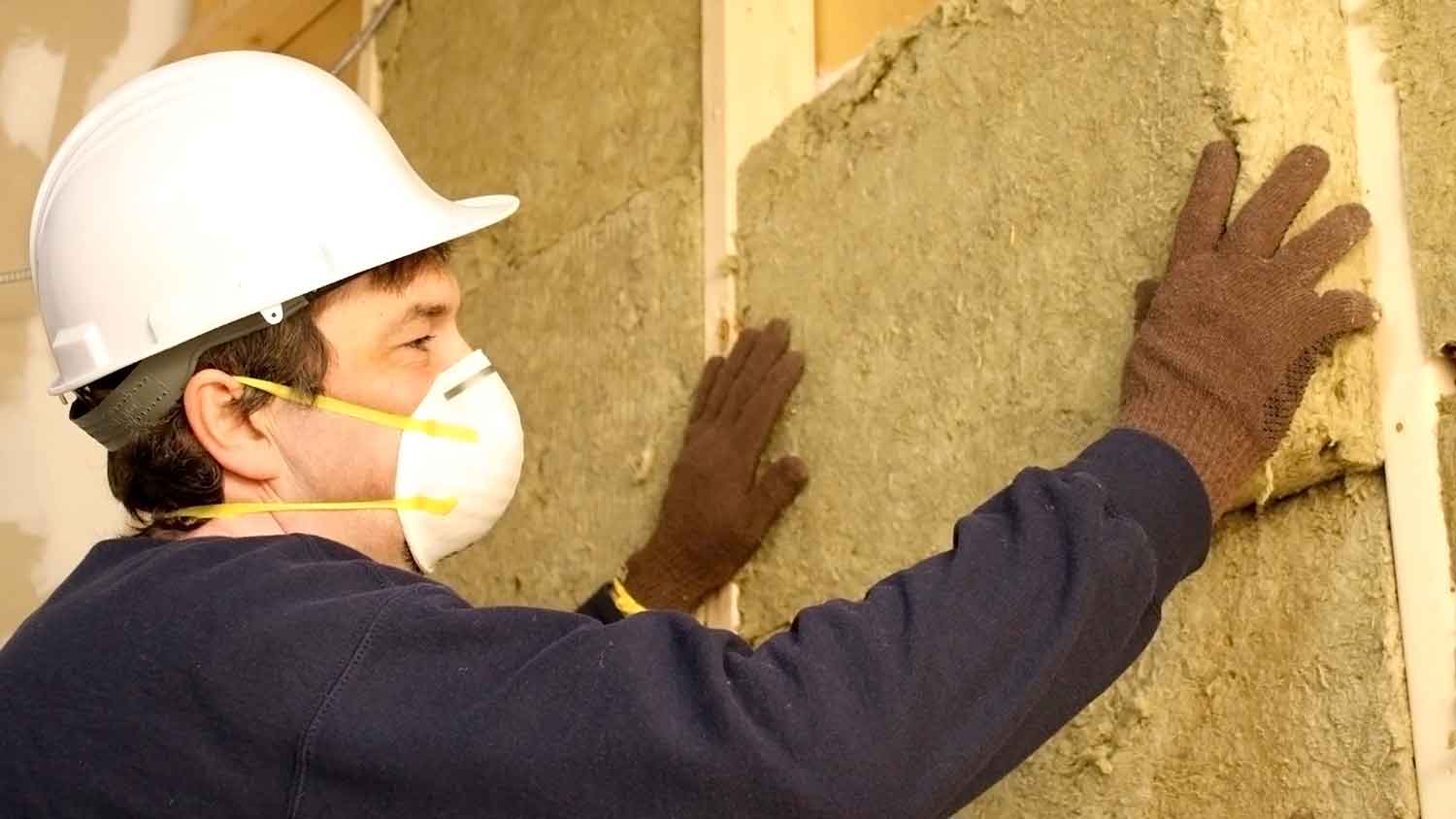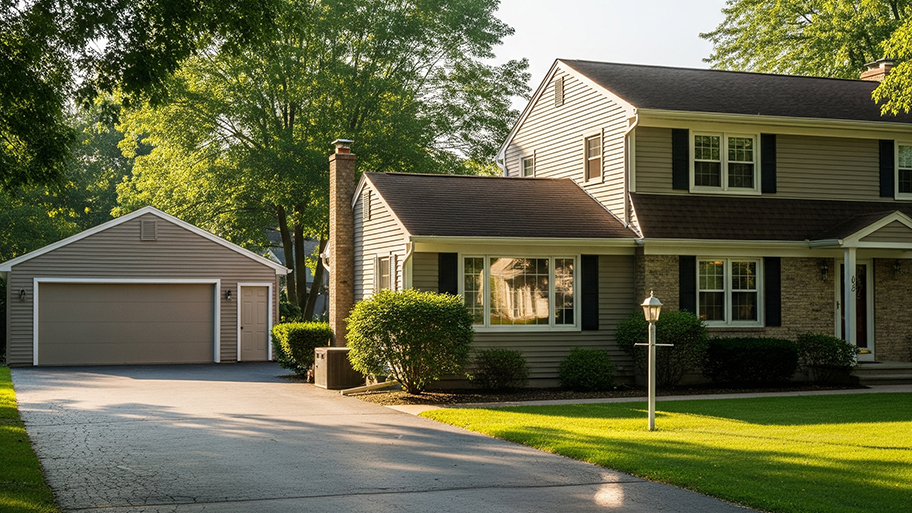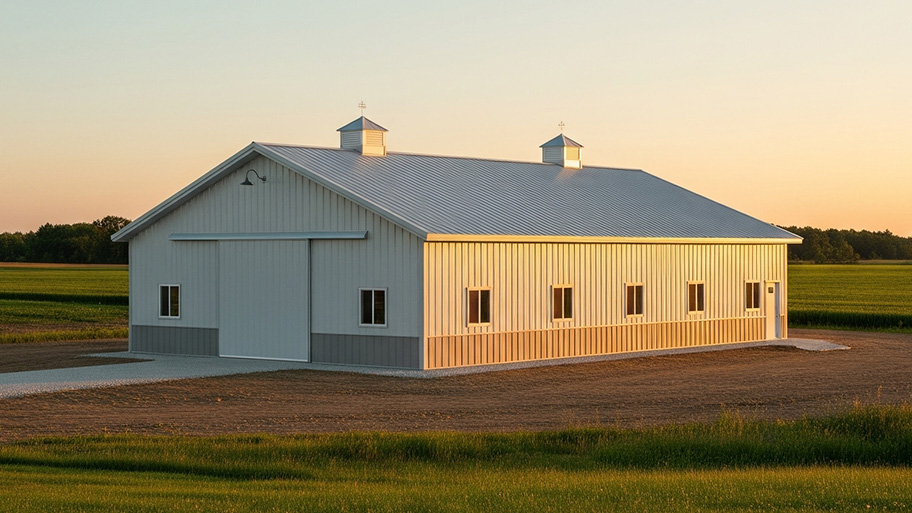A garage extension is a great way to add space for work, hobbies, and storage. Learn how much a garage extension costs so you can budget accordingly.
How Much Does It Cost to Insulate a Garage? [2025 Data]
The cost to insulate a garage is $4,700 on average, but ranges between $1,900 and $7,700, depending on the garage size and insulation type.


The cost to insulate your garage varies depending on its size, the insulation materials you choose, prep and finishing work, and labor rates.
A single-car garage costs $600 to insulate, while a three-car garage averages $6,000.
Upgrading to an insulated garage door costs between $1,100 and $4,200 on average.
Adding drywall and painting it for a finished look starts at an additional $3.50 per square foot.
You may need a permit, which costs between $75 and $700, depending on your area.
Insulating a garage costs around $4,700, with costs commonly ranging from $1,900 to $7,700 or more. Insulating your garage carries many benefits, including reducing energy loss, adding usable space, and protecting your vehicles and stored items. However, adding insulation to your garage also provides some less-expected benefits. Increased home value, more comfort in the home's living space, and garage structure protection are additional advantages of insulating your garage.
Insulating a Garage Cost Breakdown
Understanding the project's scope is crucial when it comes to the cost of insulating a garage. While the steps for insulating a garage are straightforward, variations in size and the space's needs before, during, and after the project will all affect the total price.
Insulation for the space may add some comfort and protection for your possessions, though it may be a significant factor in the cost of a garage remodel. Below are the primary cost factors determining how much you'll spend on the project.
Preparation
While preparing to insulate a garage isn't a major cost factor, addressing it early in the project is essential, especially for older garages. The wall and ceiling structures must be in good shape before covering the surfaces in a garage with insulation and a vapor barrier. Water damage, including mold, requires removal and repair, and structural damage, such as broken studs, also needs attention before starting the project.
Mold remediation costs an average of $10 to $25 per square foot, while framing repair costs between $3 and $6 per linear foot. These costs will increase the total cost of the garage insulation project.
If your garage already has drywall on the walls, you may choose to leave it in place and use blown-in insulation or remove it and start from scratch. Expect to spend between $100 and $300 per wall for drywall removal and disposal.
Garage Size

The size of the garage will determine how much material you'll need to insulate the space and substantially affect the project's labor costs.
| Garage Size | Average Cost Range to Insulate |
|---|---|
| Single-car | $600–$4,000 |
| Two-car | $1,500–$6,700 |
| Three-car | $6,000–$13,000 |
Project Scope
Details involved with your garage insulation project can raise or lower the cost. Factors like whether or not the doors require weatherstripping or whether or not you'll insulate the garage door during the project all have associated price tags.
Insulating the garage door, if necessary, can add between $300 and $1,500 to the project cost, while adding weatherstripping to the garage door and service entrances averages between $200 and $600 for everything necessary. You can also purchase an insulated garage door if you’re planning on replacing your current door anyway; if doing so, you’ll need to factor garage door installation costs into your budget. Here’s who to hire to install your garage door if you aren’t up for the task.
Creating a complete envelope by insulating the garage ceiling or isolating the attic space costs an average of $530 for the materials. Depending on what type of insulation you choose, adding a vapor barrier costs between $0.50 and $0.70 per square foot. While spray foam and other types of insulation provide their own vapor barrier qualities, batt and blown-in insulation types need a separate barrier material.
| Project | Average Cost (Per Square Foot) |
|---|---|
| Weatherstripping | $6–$30 |
| Ceiling insulation | $1.11–$3.20 |
| Vapor barrier installation | $0.50–$0.70 |
Insulation Materials
Several types of insulation are available and appropriate for use in the garage. The type you choose will determine the R-value or heat transfer efficiency rate and the project's cost.
| Type of Insulation | R-Value (Per Inch of Thickness) | Average Material Price (Per Square Foot) |
|---|---|---|
| Fiberglass batt | 3.1–4.3 | $0.30–$1.50 |
| Mineral wool batt | 3.1–3.4 | $1.40–$4 |
| Blown-in fiberglass or wool | 2.2–4.3 | $1.50–$2.20 |
| Blown-in cellulose | 3.2–3.9 | $0.60–$2.30 |
| Rigid foam board | 3.8–7.9 | $2–$4 |
| Open-cell spray foam | 3.5–3.7 | $1.60–$5.50 |
| Closed-cell spray foam | 6.0–6.5 | $2.60–$8.00 |
| Reflective or radiant barrier | 3.5–5.5 | $0.60–$2.50 |
Finishing
Whether you finish your garage insulation project by installing drywall or leaving the insulation exposed will depend on how you use the space. The cost of installing garage drywall will significantly impact the cost of the project. However, doing so will improve the appearance and functionality of the space. If you leave existing drywall and add insulation behind it, the wall will require hole repair at the project's completion.
| Finishing Details | Average Cost (Per Square Foot) |
|---|---|
| Drywall installation | $1.50–$3.50 |
| Drywall repair | $50–$75 |
| Paint | $2–$6 |
Labor
Installation labor makes up a significant portion of the cost of insulating a garage. Local insulation installers often charge by the hour at a rate of between $40 and $80. Larger garages and more complex installations will cost more than small, simple jobs due to the increased hours necessary to complete the work.
If you hire a drywall installer near you, require drywall repair, or use a nearby painting company to finish the space, expect additional cost for the work. Drywall installation costs $1.50 to $3 per square foot, while painters cost $20 to $50 per hour.
Permits
Insulation projects require obtaining a building permit in most municipalities. The permit cost varies widely by state and community, ranging from $75 to $700.
Location
Your home’s location can affect the total cost of insulating your garage. While climate conditions don't significantly impact insulating prices, garages in colder regions can benefit from additional attic or ceiling insulation, which can increase the material cost somewhat.
More significant price variables based on location are whether or not you live in a metro or rural area. Prices for labor are often higher in cities and suburbs than in rural areas.
Insulating a Garage Individual Cost Factor Details
Many factors influence the cost of insulating a garage. However, the factors that impact pricing the most are also the ones with the largest price variables.
Prep Work
Newer or well-maintained garages may require no prep work at all before beginning an insulating project. However, damaged or neglected garages can cost over $1,000 to repair or remediate mold in preparation for the insulating job.
Finish
How you finish your insulation project can cost very little or a great deal. Many homeowners opt to leave their new insulation exposed to keep costs to a minimum. However, many more choose to finish the garage space with drywall and paint, costing up to $3,000 or more.
Insulation Type
The cost of insulating a garage varies widely by the cost of the type of insulation and the quantity. Garages requiring more material to cover the space or to gain a particularly high R-value will cost more than garages with less costly insulation types or less material thickness.
Types of Insulation

The type, quantity, and location of various types of insulation will all factor into the job's total cost. Below are the best uses for various insulation types.
Batt
With R-values of between 3.1 and 4.3 per inch of thickness, batt insulation of fiberglass or mineral wool is excellent for use in garage walls and ceilings. Thicker batts are common for use in garages with insulated attic floors. It's the least expensive yet effective insulation type, starting at just $0.30 per square foot.
Fiberglass and wool
Fiberglass and wool insulation types are available in batts, loose, or as blown-in insulation. These compositions are material types rather than insulation types. Insulation containing these materials can have R-values ranging from 2.2 per inch of thickness to 4.3.
Spray Foam
Spray foam insulation is available in closed or open-cell forms, with open-cell foam being less expensive but also having significantly lower R-values. Spray foam insulation is common for walls and ceilings and doesn't require the addition of a separate vapor barrier.
Rigid Foam
Rigid foam insulation comes in a wide variety of types and thicknesses. R-values range from 3.8 to 7.9, depending on material and construction. For use in garages, rigid foam can provide excellent insulation for the garage door, service doors, walls, and ceilings. However, its higher cost over batt insulation limits its use to smaller areas.
Blown-In
With R-values from 2.2 to 4.3, depending on material type, blown-in insulation is excellent for insulating behind existing drywall on walls and insulating garage attic spaces. Because the material is loose, blown-in insulation can create a virtually custom R-value in a garage attic.
Radiant Barrier
Radiant barrier or reflective insulation types have R-values ranging from 3.5 to 5.5 per inch of thickness. However, these materials are thin, making them excellent for generating a high relative R-value without much thickness on surfaces such as doors in a garage.
Why Should You Insulate a Garage?
While insulating a garage is a great investment in your home, there are several other reasons to do it. Here's a list of the best and most common benefits.
Reduce Heating and Cooling Losses
Even if you don’t condition the air inside your attached garage after insulating it, you’ll slow the movement of warm air out of your home in the winter (and into your home in the summer). This can impact the comfort of the room directly next to the attached garage and your heating and cooling costs.
Add Soundproofing
Insulating the walls and ceiling of your garage reduces sound transfer between the garage and the home’s living space. If you do a lot of work in your attached garage, your family will likely appreciate a barrier to your noise. If you use your garage as a space to work out or hang out, you may also appreciate the reduced noise from the outside world.
Increase Your Home’s Value
While you shouldn’t expect to recoup your entire investment, an insulated garage could factor into a higher home price when you are ready to sell. The right buyer may be more motivated to make an offer knowing that the garage is already insulated; showing them the savings on your utilities can help make the sale!
Minimize Moisture Damage
Proper garage insulation can reduce moisture damage by keeping the interior temperature more consistent, thus minimizing condensation buildup. Over time, such condensation could lead to mold problems.
Add Usable Space
Your garage is a great candidate for a home gym, an office, a play area, an art studio, a workshop, and many other functions—but if it’s not insulated, the space may not be usable for large portions of the year. By insulating the garage (and perhaps installing heating and air, or at least space heaters and window AC units), the space becomes usable year-round.
Create Additional Storage Space
Your garage is an excellent place to store a wide variety of wares, including games, lawn care equipment, holiday decorations, old keepsakes, and infrequently used electronics and appliances. However, many of these items are sensitive to extreme temperatures. By insulating your garage, you’ll make it more usable as a storage space, without risking damage to your belongings.
Protect Your Home’s Utility Equipment
Similarly, if you want to install any plumbing in your garage—like for a hose, washing machine, or utility sink—you need to make sure the pipes are properly insulated. Even if your attached garage doesn’t have utilities, it shares an interior wall with one section of your house; if that wall contains pipes, you’re vulnerable to frozen pipe bursts in the winter, unless you insulate the wall.
Protecting Vehicles
Finally, an insulated garage protects the very thing garages are built for: vehicles. Your car’s electrical components could be damaged in extreme temperatures. By parking it in an insulated garage, you can better protect it. Plus, a car in an insulated garage is more comfortable to get into on a hot or cold day than one in an uninsulated garage.
Cost of Common Garage Insulating Add-Ons
As long as everything is out of the garage during your insulation project, here are several commonly paired tasks and their costs:
Install new windows cost: $180–$410 per window
Repair the garage floor cost: $100–$500
Paint garage walls cost: $2–$6 per square foot
Install a new garage door costs: $750–$1,670
Upgrade to an insulated garage door cost: $700–$2,300
Upgrade garage entry door cost: $375–$2,000
Install a garage heater cost: $1,500–$4,000
Install a garage workbench or storage cost: $500–$5,000
Ways You Can Save Money On Garage Insulating
Insulating your garage can be an excellent investment in your home and how you use it. There are a few ways to reduce the total project cost.
DIY some of the work: Insulating tasks are often best left to professionals. However, if there's demo work to do or you don't mind doing some parts of the job, your contractor can likely work with you to save some cash.
Keep doors and windows closed: After spending money to insulate your garage, getting the most out of your investment means using the doors and windows responsibly by keeping them closed when necessary.
Get three price quotes: While getting multiple quotes for your project won't reduce the cost in and of itself, doing so can allow you to see more than one solution for the task and may expose more cost-effective ways of handling it. Also, you can choose a contractor based on price and value instead of relying on one price listing.
Why You Should Hire a Garage Insulation Pro
While insulating a garage can appear simple at first glance, it’s a fairly complex project. Improper installation can lead to costly mistakes and inefficiency over time.
Hiring a local insulation pro helps to ensure correct and effective installation, avoid permit inspection issues, and provides lasting protection for your garage.
Here’s why it’s ideal to hire a garage insulation pro
Properly installing garage insulation requires specialized tools and expertise. Here’s why it’s best to hire a pro for the job:
Professionals know how to choose the right type of insulation for your garage’s walls, ceilings, and doors.
Hiring a pro ensures your project complies with local building codes and efficiency standards.
DIY installation can lead to gaps, moisture issues, and reduced energy efficiency.
Experienced installers know how to handle wiring, plumbing, and ventilation properly.
Professionally installed insulation improves your garage’s energy efficiency, temperature control, and long-term comfort.
If you want to DIY garage insulation
If you want to assist your pro with the installation, consider helping out with the following tasks:
Clear out cars, storage, and tools from your garage to provide the installer with easy access.
Measure your walls and ceiling in advance so your pro can plan the placement of materials.
Tape, staple, or seal edges with your pro’s guidance.
Clean up debris, insulation scraps, or dust after the job is complete.
Be ready to discuss with your pro which type of insulation, such as batt, fiberglass, or blown-in, best fits your budget and needs.
Provide your installer with precise measurements of the walls, ceiling, and garage door.
Ask about potential upgrades, such as vapor barriers, soundproofing, or higher R-values.
Let your pro know about any wiring, plumbing, or ventilation concerns that could affect the installation's complexity.
How Angi Gets Its Cost Data
Home is the most important place on earth, which is why Angi has helped more than 150 million homeowners transform their houses into homes they adore. To help homeowners with their next project, Angi provides readers with the most accurate cost data and upholds strict editorial standards. We extensively research project costs to develop the pricing data you see, so you can make the best decisions for you and your home. We rely on reputable sources, including the U.S. Bureau of Labor Statistics, academic journals, market studies, and interviews with industry experts—all to ensure our prices reflect real-world projects.
Want to help us improve our cost data? Send us a recent project quote to [email protected]. Quotes and personal information will not be shared publicly.
The homeowners guide to garage services
From average costs to expert advice, get all the answers you need to get your job done.

The cost to build a detached garage depends on the size, materials, labor, and more. Read this guide to learn more about detached garage costs.
 •
•Discover the cost to build a pole barn, including average prices, key cost factors, and tips to help you budget and plan your project with confidence.

Looking for the right garage heater size for your space? Keep reading to learn how to choose the right size based on garage square footage.

If you’ve ever wondered, “Who can I get to build a carport?” you’re in the right place. Read on to learn about professional carport builders.

If you want to cover your garage walls but aren’t sold on drywall, check out these five drywall alternatives. Your garage walls will thank you.

